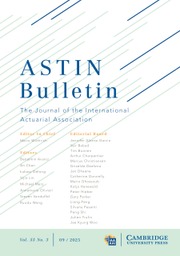Article contents
International Equity Portfolios and Currency Hedging: The Viewpoint of German and Hungarian Investors*
Published online by Cambridge University Press: 29 August 2014
Abstract
In this paper we study the benefits derived from international diversification of equity portfolios from the German and the Hungarian points of view. In contrast to the German capital market, which is one of the largest in the world, the Hungarian Stock Exchange is an emerging market. The Hungarian stock market is highly volatile, high returns are often accompanied by extremely large risk. Therefore, there is a good potential for Hungarian investors to realise substantial benefits in terms of risk reduction by creating multi-currency portfolios. The paper gives evidence on the above mentioned benefits for both countries by examining the performance of several ex ante portfolio strategies. In order to control the currency risk, different types of hedging approaches are implemented.
Keywords
- Type
- Workshop
- Information
- Copyright
- Copyright © International Actuarial Association 2002
Footnotes
Financial assistance from the Deutsche Forschungsgemeinschaft, SFB 504, University of Mannheim, the Landeszentralbank of Hessen, the German Actuarial Society (DAV), the Bundesverband Deutscher Investmentgesellschaften (BVI) and the Hungarian National Scientific Research Fund (OTKA F023499) are gratefully acknowledged. The authors thank the participants of the AFIR-International Colloquium 1999 in Tokyo and of the FUR IX 1999 Conference in Marrakesh for helpful comments. The Comments of the two anonymous referees improved the paper substantially. The authors are also grateful to Alexander Mertz and Frank Reiner for excellent research assistance, A. Tóth (Information Centre of the Budapest Stock Exchange) for his support in data collection. The authors alone are responsible for the remaining errors.
References
- 9
- Cited by


